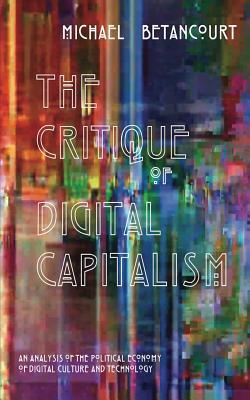The critique introduced in this book develops from basic questions about how digital technologies directly change the structure of society: why is "Digital Rights Management" not only the dominant "solution" for distributing digital information, but also the only option being considered? During the burst of the "Housing Bubble" burst 2009, why were the immaterial commodities being traded of primary concern, but the actual physical assets and the impacts on the people living in them generally ignored? How do surveillance (pervasive monitoring) and agnotology (culturally induced ignorance or doubt, particularly the publication of inaccurate or misleading scientific data) coincide as mutually reinforcing technologies of control and restraint? If technology makes the assumptions of its society manifest as instrumentality - then what ideology is being realized in the form of the digital computer? This final question animates the critical framework this analysis proposes.
Digital capitalism is a dramatically new configuration of the historical dynamics of production, labor and consumption that results in a new variant of historical capitalism. This contemporary, globalized network of production and distribution depends on digital capitalism's refusal of established social restraints: existing laws are an impediment to the transcendent aspects of digital technology. Its utopian claims mask its authoritarian result: the superficial "objectivity" of computer systems are supposed to replace established protections with machinic function - the uniform imposition of whatever ideology informs the design. However, machines are never impartial: they reify the ideologies they are built to enact. The critical analysis of capitalist ideologies as they become digital is essential to challenging this process. Contesting their domination depends on theoretical analysis. This critique challenges received ideas about the relationship between labor, commodity production and value, in the process demonstrating how the historical Marxist analysis depends on assumptions that are no longer valid. This book therefore provides a unique, critical toolset for the analysis of digital capitalist hegemonics.
